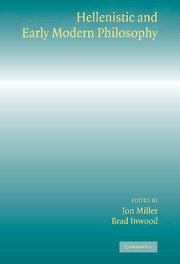Book contents
- Frontmatter
- Contents
- List of Abbreviations
- Notes on Contributors
- Preface
- Introduction
- 1 Stoicism in the Philosophical Tradition
- 2 Early Modern Uses of Hellenistic Philosophy
- 3 Locke's Offices
- 4 Patience sans Espérance: Leibniz's Critique of Stoicism
- 5 Epicureanism in Early Modern Philosophy
- 6 Stoics, Grotius, and Spinoza on Moral Deliberation
- 7 The Discourse on the Method and the Tradition of Intellectual Autobiography
- 8 Subjectivity, Ancient and Modern
- 9 Spinoza and Philo
- 10 Hume's Scepticism and Ancient Scepticisms
- 11 Stoic Naturalism in Butler
- Bibliography of Primary Sources
- Bibliography of Secondary Sources
- Index (general)
- Index (of selected text passages)
6 - Stoics, Grotius, and Spinoza on Moral Deliberation
Published online by Cambridge University Press: 05 August 2012
- Frontmatter
- Contents
- List of Abbreviations
- Notes on Contributors
- Preface
- Introduction
- 1 Stoicism in the Philosophical Tradition
- 2 Early Modern Uses of Hellenistic Philosophy
- 3 Locke's Offices
- 4 Patience sans Espérance: Leibniz's Critique of Stoicism
- 5 Epicureanism in Early Modern Philosophy
- 6 Stoics, Grotius, and Spinoza on Moral Deliberation
- 7 The Discourse on the Method and the Tradition of Intellectual Autobiography
- 8 Subjectivity, Ancient and Modern
- 9 Spinoza and Philo
- 10 Hume's Scepticism and Ancient Scepticisms
- 11 Stoic Naturalism in Butler
- Bibliography of Primary Sources
- Bibliography of Secondary Sources
- Index (general)
- Index (of selected text passages)
Summary
The concept of a philosophical legacy is figurative. A literal legacy involves the transfer of tangible goods (and perhaps intangible ones, such as peerages) from one generation to another. Like literal legacies, philosophical legacies also involve the transfer of goods between generations. But unlike literal legacies, the goods being transferred in philosophical legacies are ideas, arguments, systems, or other such philosophical entities. This difference in a philosophical versus literal legacy is important, and complicates considerably the correct use of the notion of philosophical legacy itself. Because philosophical legacies consist in ideas, arguments, and so forth, those “inheriting” them must necessarily engage in acts of interpretation. Because philosophical legacies necessarily involve interpretation, they are not fixed: what the legacy or bequest actually means or amounts to depends, to a greater or lesser extent, on the person receiving it. This is not necessarily the case with literal legacies, in which the inheritors can receive their inheritance without any effort (intellectual or otherwise) on their part.
I begin with these comments because the Stoics' theory of the natural law has long been regarded as one of their most lasting and influential legacies. This is arguably true, but depending on how the notion of the legacy itself is understood, there is a real risk of simplifying and distorting the interactions that occurred between the Stoics and their successors.
- Type
- Chapter
- Information
- Hellenistic and Early Modern Philosophy , pp. 116 - 140Publisher: Cambridge University PressPrint publication year: 2003
- 2
- Cited by

